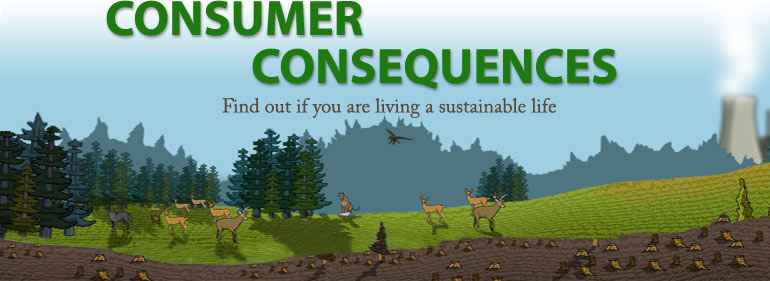Marketplace has an interactive game called “Consumer Consequences” that is worth checking out. My current lifestyle is estimated to require 2.9 Earths to sustain it. What about yours?
Check out the game and some background info by clicking here. 
September 22, 2007Change, Community, Consumerism, Current Events, Environment, Food, Fun, Politics, Science, Stewardship, Wealth
Marketplace has an interactive game called “Consumer Consequences” that is worth checking out. My current lifestyle is estimated to require 2.9 Earths to sustain it. What about yours?
Check out the game and some background info by clicking here. 
Oh, I love stuff like this. Especially when I’m trying to put off reading the most boring interpretation of Martin Buber I’ve ever seen… My score was 2.6 planets and interestingly enough, it was food that did me in, even without consuming any meat. I think it was my coffee habit that did me in — I wouldn’t have thought a cup a day would be such a big deal. Who knew?
I thought it was the coffee too, Lora, but I went back in and fiddled with it–and even eliminating coffee completely didn’t change anything. The major factors seemed to be how much one eats and how much is locally grown. Astonishing, though, how much of our footprint comes from food!
My score was 2.8 planets. But personally I think that this test is biased and agenda driven. Not that I don’t agree that Americans are too greedy, we definitely are. But I am very conservative with all of my resources and I think that number was far too high. Also I am the same as Lara food did me in and I primarily consume grains, cereals etc.
Oh yeah, and another reason I think that it was biased because the answer they always had for trying to change this was more government policy. And that is a very Democratic big government solution. I of course being a Libertarian disagree with that.
Ben, I respect your issues with the Democratic “big government” solutions they may propose, but I think it’s good to recognize that even when Americans are “very conservative” with our resources, we still use way more than our “fair share” of the world’s energy and resources. My number was 1.9 — on one hand it feels good to know that I’m doing more than many Americans, but the other service this provides is to remind us “environmentally conscious” liberals that we’re still part of the problem.
Liberals and libertarians. :)
I’d tend to agree with Jonny, though — there’s a lot in the U.S. that raises our score that we don’t even think about. I spent part of June and July in Northern Ireland and was both annoyed and refreshed by the fact that every time I wanted to use an electrical outlet, I had to flip a switch by the outlet. Even ovens had switches — it seems minor but I’d guess it makes a substantial difference between our per capita energy consumption and theirs. When I asked people there about those switches or why, for example, they tend to drive such small cars (the average car was about the size of a VW Golf), they explained to me that it mostly had to do with government policy, either legislation or taxes (the larger the vehicle, the higher the tax). I’m not a huge fan of big government, either, but I can’t think of any instance in which the market (purely on its own) has been able to address issues like these; nor am I sure of other good ways to instill that sense of responsibility and collectiveness.
I thought it was interesting they pushed the transportation angle in the article at the end, but out of all my scores, the food one was the highest by far. That, even though I drive over 1,000 miles a month alone in my small car. I’d have to eat 100% local to bring the food score one down much, and I’m afraid that’s not likely to happen soon. The 100-mile diet people are fascinating, but I don’t think I have the energy to do all that by myself. I’d have to do it as a household with at least 2-3 other people.
Ben, I sympathize – my first reaction upon seeing my score was “What! But… I recycle, don’t own a car, and don’t eat much meat!” It’s easy to think that we’re doing better than the “average” consumer, however, as J. Alan Meyer stated, even when Americans are conscious of their resource use, we still are granted a larger share than many people.
The “more gov’t policy needed” bit did cause me to raise an eyebrow as well- certainly there’s something more additional legislation that can be done? However, it’s fairly clear by this point that the invisible hand of the market isn’t going to fix things on its own…